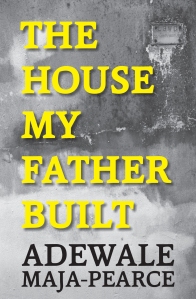
And so it was, at last, that I had entered into my possession, as the late Prince himself would have put it. The journey had begun twenty years earlier when my father died, although I had to wait another ten years for the terms of his will to be satisfied before I could lay claim to it. Naively, I had assumed that the tenants would leave of their own accord when I called on each of them in turn, and that the courts would quickly deal with any stragglers. Even at this distance I still clearly recall the Alhaji smirking at my English accent as he heard me out in his parlour. He knew the score. He also knew that I was unlikely to stay the course and he was almost proved right.
But I was also lucky. I was lucky that two of the tenants did indeed comply with the one year rent-free I offered them, lucky in a job that enabled me to travel back and forth at will, lucky in the nation’s on-going tragedy – Abiola, Abacha, Saro-Wiwa: the three faces of our collective dilemma – which kept the country centre-stage. I was lucky, finally, in having to fight for it, which was the measure of what it meant to me – and with it the country I desired to make my own.
Childhood was an unreliable guide, made more so by my privileged upbringing where the gutters didn’t overflow and there was more than one bathroom with running water. Now I had to see the country for what it was: the Alhaji laughing on his way out of the magistrates’ office while I waited three hours for the next date; Baba Ibadan ordering me to ‘sign, my friend’ at a police station which specialised in torture; Prince hiring suspected killers to dispose of me. As Prince himself used to say, ‘Move by faith and not by sight,’ which I thought a good philosophy, even if he didn’t seem inclined to follow it himself, as I would invariably remark whenever he uttered it, whereupon he would burst into laughter, revealing his missing front tooth.
But all that was a long time ago now, longer than the time it took me to dislodge the Alhaji and Ngozi and Pepsi, and longer again since my father died, the man who had willed me the house he built that made it all possible. I have written about him elsewhere. I had my problems with him; he had his problems with me. One of them was that I wanted to be a writer, not a physician, an incomprehensible decision which kept us estranged for years. The irony was that Nigeria was all that engaged me as a writer, which was why his gift was so apt, even if he hadn’t imagined it that way.
©
Adewale Maja-Pearce
Adewale
Maja-Pearce is the author of several books, including Loyalties
and Other Stories, In My Father's Country, How many miles to Babylon?, A
Mask Dancing, Who's Afraid of Wole Soyinka?, From Khaki to Agbada,
Remembering Ken Saro-Wiwa and Other Essays, A Peculiar Tragedy, and
Counting the Cost, as well as the 1998 and 1999 annual reports on human
rights violations in Nigeria. He also edited The Heinemann Book of African
Poetry in English, Wole Soyinka: An Appraisal, Christopher Okigbo:
Collected Poems, The New Gong Book of New Nigerian Short Stories,
and Other Stories, In My Father's Country, How many miles to Babylon?, A
Mask Dancing, Who's Afraid of Wole Soyinka?, From Khaki to Agbada,
Remembering Ken Saro-Wiwa and Other Essays, A Peculiar Tragedy, and
Counting the Cost, as well as the 1998 and 1999 annual reports on human
rights violations in Nigeria. He also edited The Heinemann Book of African
Poetry in English, Wole Soyinka: An Appraisal, Christopher Okigbo:
Collected Poems, The New Gong Book of New Nigerian Short Stories,
and
Dream Chasers.
Click here to see Maja-Pearce's amazon.com page: http://www.amazon.com/Adewale-Maja-Pearce/e/B001HPKIOU
Click here to see Maja-Pearce's amazon.com page: http://www.amazon.com/Adewale-Maja-Pearce/e/B001HPKIOU
